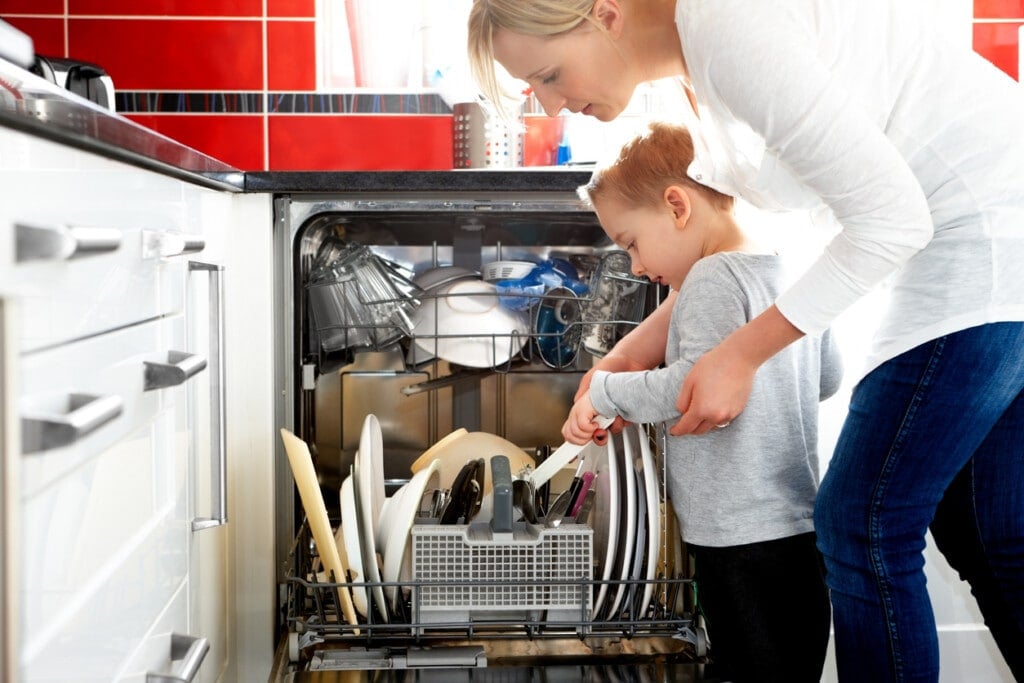Parenting is the real deal. These tiny people come into our lives, and we must ensure they feel safe, loved, and confident. We must teach them life skills like wiping their butts, using manners, and navigating friendships, sometimes all before breakfast. I believe it’s the biggest, most important thing I’ll ever do—this motherhood gig—but it can seem overwhelming.
Sometimes, a handy list can help parents who feel like they are drowning get a big gulp of air. (It does for me, at least). So, here are 21 important life skills to teach your children, and if it seems like a lot, don’t worry—you’re probably already doing most of them!
Important Life Skills to Teach Your Children
1. How to Look at People When They Speak
Today’s young people spend much of their time looking down at a phone or a screen, but we must also ensure they remember the basic life skill of looking up. Chances are they’ll have a job interview someday, a class presentation, or any of the millions of reasons people still talk face to face, so we need to ensure our kids know how to lift their eyeballs and speak to another human.
2. How to Shake Hands
Okay, maybe not when they’re three, but as they grow up and start doing “big kid” things, someone, at some point, is going say, “Nice to meet you,” and put out their hand for a shake.
3. How to Use Their Voice
Whether to assert themselves and ask for a raise they deserve or order food at a restaurant, we need to ensure our kids know how to make themselves seen and heard in this busy world.
4. How to Work as a Team
Your child will likely have to work with others in some capacity as they move through life, so you must teach them this valuable life skill. Working as a team means pulling their weight, speaking up with maturity and respect when a team member is unfair, and supporting one another. Working well with others will give them a far better chance of landing a job they love and finding fulfillment.
5. How to Apologize
Nobody gets through this life without messing up. And sometimes those mistakes are big ones. Our children must know the importance of owning their mishaps, apologizing, and making amends.
6. How to Say Thank You
Some parents still insist on hand-written thank-you notes. We aren’t as focused on that in our home, but we ensure that our children express gratitude in many ways. They say “thank you” (and mean it!) when someone gives them a gift or does something kind for them. They might call or FaceTime Grandma to say thank you for a new board game or LEGO set, and they might even invite the person who sent them that awesome new board game over to play it. There are endless ways to express gratitude, so if you raise grateful kids who know how to show appreciation, you’re doing wonderfully.
7. How to Cook
They don’t need to be sous chefs competing on Food Network to get through life (unless they want to, in which case I say shoot for the stars), but kids should know basic cooking skills as they mature into adolescence and adulthood, like boiling pasta, frying an egg, and making a sandwich. At some point, they will get hungry, and no one will be around to make something for them. So, it’s on us to ensure they can fill their bellies.
8. How to Safely Use a Knife
This is an important life skill for the kitchen and any other time and place they might need to cut something with a knife—like camping, fishing, or hunting. You never know when you might need to rip up fabric to fashion a makeshift tent or cut up kindling for a fire to keep warm!
9. Memorize a Few Key Phone Numbers
Remember when we were kids, no one had cell phones, and we had to memorize things like phone numbers? What happens if your child loses their phone and needs to call you? Do they know your phone number? Another parent’s number? A close friend’s? Grandma’s?
10. How to Spell Their Name and Remember Other Important Information
Along those same lines, your kids should know how to write and spell their name, address, parents’ names, and probably where their parents work. Cover your bases, think of worst-case scenarios, and make sure your children have the tools to communicate all the necessary information with authorities.
11. What to Do in Case of an Emergency
As well as knowing all the information above, do your kids know how to dial 911? Have you reviewed the emergency safety plan? Do they know what to do if there is a fire? Make sure they know to get out ASAP and have a family meeting place outside so you can all find each other if you must evacuate quickly.
12. How to Be Safe on the Internet
Our parents didn’t have to worry about this, but we do. Make sure your children understand the risks of internet usage, know never to give out their personal information, never share pictures with strangers, and always tell a grownup if something doesn’t feel right. As they get older and start texting and using social media, they need to understand that the Internet is forever, so they need to THINK before they post a tweet or image to Instagram or send something that seems funny (but might be offensive) to a friend.
13. How to Do Laundry
You can do this one in stages. Young toddlers can bring you their dirty clothes and put clean clothes away. Older kids can do more, like run the machine, add the soap, transfer wet clothes to the dryer, etc. But yeah, they’re not going to live with you forever, so at some point, they need to know how to do this arduous chore.
14. How to Clean the Kitchen
There’s more to cleaning the kitchen than putting clean dishes away. Someday, our children will have their own kitchens—do they know how to load the dishwasher? Do they understand that some items need to be hand-washed? Or that they need to sanitize the sink? How about how to wipe down the stove, floor, and cabinets? Make sure to involve them in all the steps.
15. How to Vacuum and Dust
Kids should also learn other basic cleaning skills, like vacuuming and dusting. Sure, it’s great if they put their toys away, but then the deep cleaning begins, and they should be a part of that, too.
16. How to Scrub a Toilet
Sure, it may not be their favorite chore (newsflash, kids—it’s no one’s favorite chore), but it needs to be done. Don’t be that gross kid in college who never cleans their toilet.
17. How to Get Their Body Clean
Speaking of cleaning, ensure your kids know what to do once they transition from baths to showers. Get soap in ALL the nooks and crannies, kids! For long hair, you need shampoo AND conditioner! Brush your teeth for two minutes AND floss. And don’t forget hand washing—get those bubbles between your fingers.
18. How to Manage Money
Start small—like a $5 per week allowance—and teach them to save a percentage. As a result, they’ll learn to appreciate their hard-earned money and value whatever that big-ticket item they saved because they had to work for it. Plus, this teaches them why we grumble when they leave the lights on or the door open—someone must pay the heating and electric bill, and guess what? That will be you someday, kids.
19. How to Care for Another Living Thing
Whether it’s their pet turtle, a puppy, a younger sibling, or even an aging grandparent, the act and responsibility of caring for another living thing is an invaluable life skill. Kids will learn compassion and how precious life is and forge a bond they can only form with caring and love.
20. How to Take Care of Themselves
Drink water. Eat a vegetable. Get some fresh air and sunlight. Sleep. We can teach our children a few basics to help their physical and mental health. Whether they do them all daily . . . well, that will be up to them.
21. How to Say Goodbye
Sometimes, this one is forced upon us, like when a family member dies or a pet dies. Or when your child’s best friend moves to another state. Our hearts break when our kids’ hearts break, but saying goodbye is a part of life. It is our job to teach our kids how to grieve, that they are allowed to feel all the feelings and to remind them that it won’t always hurt this much.
As we know, children don’t come with instruction manuals. We parents must blindly feel our way through this journey, trying things out, getting some things right and other things horribly wrong, and hoping that with all our efforts, we can look at the humans we raised with pride. Even if they invite us to their grownup apartment someday and serve toast for dinner. We’ll eat that toast with gratitude and say, “I’m proud of the person you have become.”































